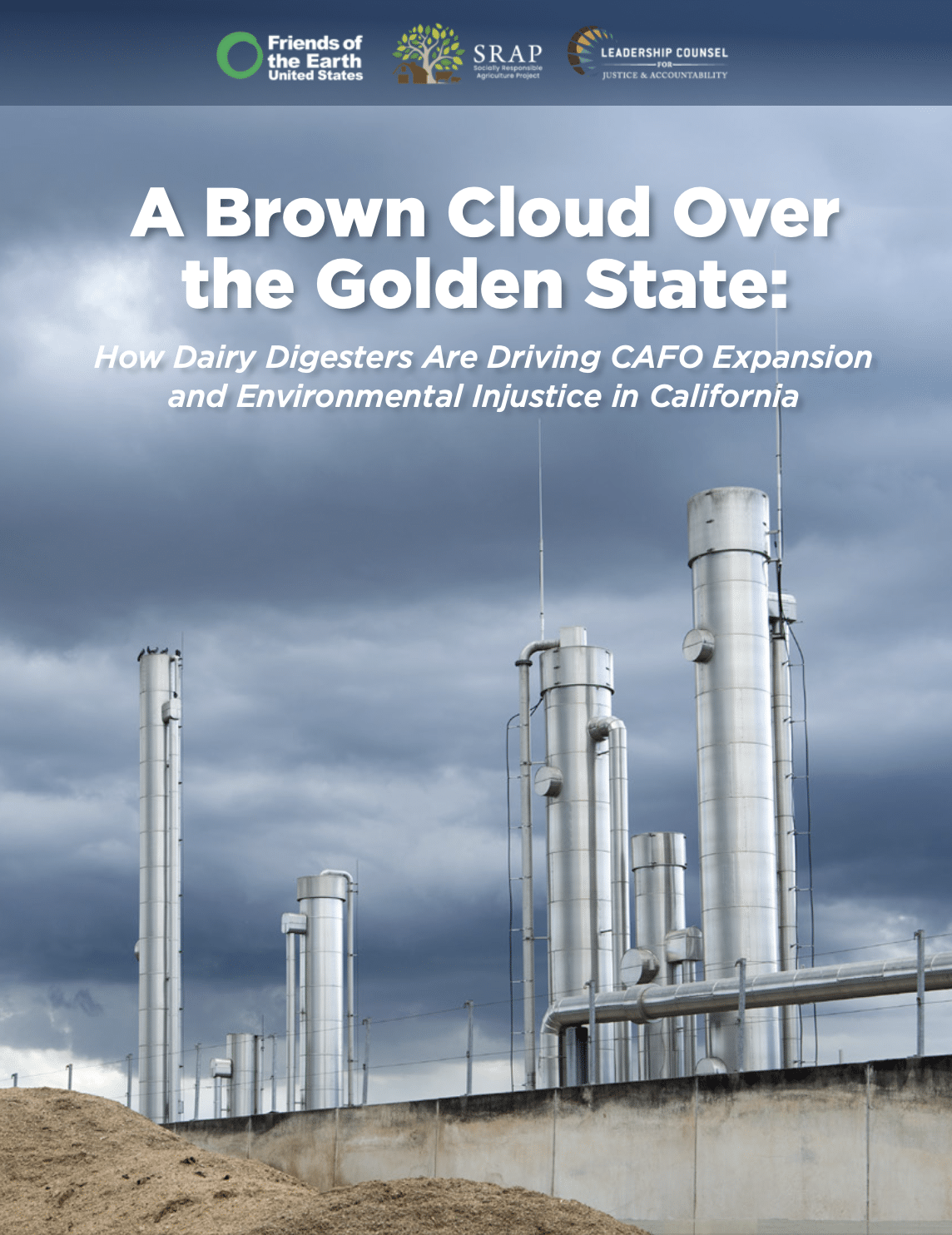A Brown Cloud Over the Golden State

How Dairy Digesters Are Driving CAFO Expansion and Environmental Injustice in California
Read the press release
Read the executive summary
Read our report on methane biogas
Leer el informe en español
Leer el resumen ejecutivo en español
Friends of the Earth, Socially Responsible Agriculture Project and Leadership Counsel for Justice and Accountability have co-published a new report, A Brown Cloud Over the Golden State: How Dairy Digesters Are Driving CAFO Expansion and Environmental Injustice in California. The report, based on interviews with residents, government data and past studies, focuses on Tulare County, the home of one third of California’s dairy cows and 11% of manure digesters in the U.S. The proliferation of industrial-scale dairy CAFOs in the community has created significant environmental and public health concerns due to the overwhelming volume of animal waste produced by these facilities. Extensive research has shown that CAFO pollution disproportionately impacts low-income communities and communities of color and Tulare County is no exception: Over 93% of dairy CAFOs in Tulare County pose threats to water quality in this predominantly (67%) Hispanic/Latine community.
Leer en Español
However, rather than reign in the explosive growth of dairy CAFOs, California has gone in the opposite direction, encouraging the development of anaerobic digesters, claiming they will help reduce the climate impacts of animal agriculture. Digesters are employed to capture methane emissions from animal waste to produce manure biogas, also known as factory farm gas—which can generate electricity or be processed into transportation fuel. However, factory farm gas systems not only fail to resolve the negative environmental and public health impacts of concentrated animal feeding operations (CAFOs), but they exacerbate pollution and safety risks to communities living near industrial livestock operations and biogas plants. Digesters also entrench the current, inherently unsustainable system of factory farms—all for overstated and inadequate methane reduction benefits.
Lavish subsidies for digesters and policy incentives such as the federal Renewable Fuel Standard and California’s Low Carbon Fuel Standard are cornerstones of government efforts to curb industrial animal agriculture’s methane emissions, and no other state has offered more support for factory farm gas than California: A third of all U.S. manure digesters are located in the state. These programs incentivize manure biogas production and encourage the largest dairies to utilize inferior and highly polluting manure management practices that maximize methane production to receive lucrative payments for biogas
The report recommends that rather than investing in manure biogas, public resources should be redirected to more effective methane reduction solutions that do not exacerbate environmental injustice and industry consolidation. Other policy recommendations include:
- Reform California’s Low Carbon Fuel Standard (LCFS) to eliminate the “avoided methane crediting;” fix the inaccurate Life Cycle Assessment that ignores upstream and downstream greenhouse gas emissions associated with factory farm gas production.
- Prevent double-dipping between subsidies, tax incentives, and programs like the Renewable Fuel Standard (RFS) and California’s Low Carbon Fuel Standard (LCFS). Related, ensure GHG reductions attributed to manure biogas are not double counted among California climate programs.
- Do not fund or incentivize manure biogas. Sunset the Dairy Digester Research and Development Program.
- Prohibit construction of new large CAFOs and expansion of those currently operating in California, particularly those facilities sited in the Central Valley.
- Regulate waste from CAFOs and digesters, including treatment and application of digestate.
- Regulate air emissions from CAFOs, including ammonia emissions and volatile organic compounds.
- Require and improve methane monitoring and reporting from livestock operations.
- Pursue methane reduction strategies that support environmental justice and fair markets for producers, including regulating methane emissions from industrial dairies, leveraging statewide food procurement toward plant-forward menus, reducing food waste, and prioritizing conservation funding for pasture-based livestock production.
- Require publicly available reporting of basic data from CAFOs and digester operators, including herd sizes and methane emissions. Fund and conduct research to assess the impact of manure biogas policies on methane emissions, industry consolidation, and rural communities.
Watch our Webinar
Ways to Support Our Work

Read Latest News
Stay informed and inspired. Read our latest press releases to see how we’re making a difference for the planet.

See Our Impact
See the real wins your support made possible. Read about the campaign wins we’ve fought for and won together.

Donate Today
Help power change. It takes support from environmental champions like you to build a more healthy and just world.